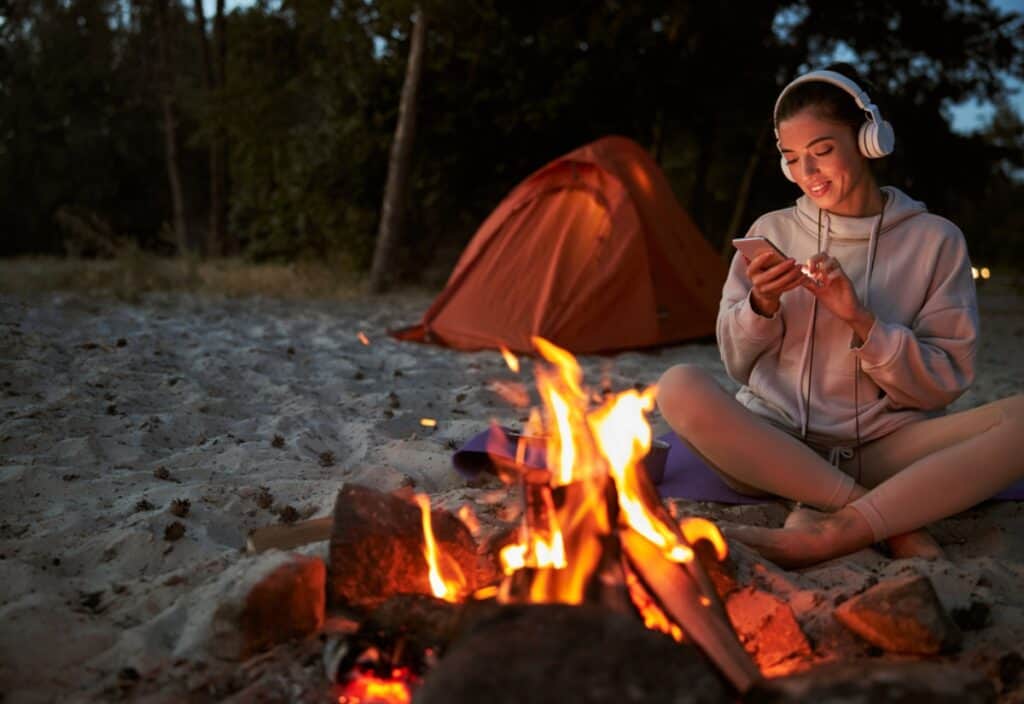Is RVing a real camping experience? Should you always follow Leave No Trace principles? And can technology enhance your time in the wilderness?

When it comes to camping, everyone seems to have a strong opinion. If you’ve ever found yourself in a heated debate around the campfire about these controversial camping topics, then keep reading.
Here are five of the most contentious issues in the camping world, sure to spark arguments and passionate discussions. Let’s settle these debates once and for all.
Tech-free camping vs. tech-enhanced camping
Should mobile devices and other tech be used while camping?
On the one hand, phones are extremely helpful for checking the weather, taking photos and contacting others when needed. Phone GPS is often essential. But on the other hand, having friends and family endlessly scroll social media while camping seems wrong. Camping is a time to connect with those around you, play games and forget about the outside world.
Other technologies are less controversial. You don’t hear arguments about solar-powered fridges, small battery-powered chainsaws and LED headlamps. For most families, the debate boils down to whether or not mobile phone use should be limited. While there’s no correct answer, having the discussion could keep everyone off their phones for at least an evening.
Is a campfire necessary?
This is a moot question for many, as many locations have complete fire bans during the height of the camping season. Other camping spots may only have limitations and restrictions.
For those who are in areas where fires are possible, are they essential to the camping experience? Some hate the smoke, the potential risks and the work involved in gathering wood and keeping the fire going. Then there are others for whom s’mores are an essential ingredient of camping, and time spent around the campfire is the most memorable part of their vacation.
These days, we’re not limited to the traditional campfire. Smokeless fire pits minimize smoke with a cleaner, more efficient burn. They’re also safer and contain the fire better — particularly when used with a spark screen. Portable propane fire pits are even less impactful. So long as you have a designated fire safety person, we say go ahead and light the fire.
RV camping vs. tent camping
Is it really camping if you’re in an RV? It’s unlikely this argument will get heated, but it’s fun to have the discussion — especially between the RV haves and have-nots.
Historically, camping is defined as temporarily living outdoors, typically in a tent or makeshift shelter, for recreation, adventure or leisure. However, many believe that true camping involves self-denial, discomfort and struggle. Is an RV just too cushy?
Modern RVs have solar power, bathroom facilities, comfortable beds and small kitchens. Some are even equipped with small wood-burning stoves. To call this camping is an insult to purists. For it to be true camping, there must be an element of suffering. Do you agree?
Alcohol or no alcohol?
This is a non-issue for most camping parties. Those who want to drink, drink. Those who don’t, do not. However, for some groups, the debate over alcohol while camping can get pretty lively.
On one side, you’ve got folks who think a cold beer or a glass of wine by the campfire is the perfect way to unwind and enjoy the outdoors. It’s all about relaxation and adding to the camping experience, right?
But there are those who say, “Hold on a minute!” They worry about safety, especially in more remote places where a wrong step or impaired judgment could lead to trouble. They’re all about keeping things clear headed and safe, and they make a good point.
At the end of the day, it often comes down to personal choice and respect for others. Whether you’re sipping a brew or sticking to s’mores and soda, the key is enjoying yourself responsibly and ensuring everyone stays safe in the wild.
Leave no trace vs. minimal impact
Leave No Trace enthusiasts are all about keeping the wilderness pristine and untouched. They follow strict guidelines to ensure they leave behind zero trace of their presence — like packing out all trash, using designated campsites and minimizing campfire impact. It’s about respecting nature and leaving it as you found it, if not better.
Minimal impact campers agree with the principle but might take a slightly different approach. They still want to protect the environment but might prioritize practicality and finding a balance. They’ll pick up trash and tread lightly, but they might choose to camp off-trail or use a small camp stove instead of building a fire on the ground.
Both sides want to preserve our outdoor spaces, but it often comes down to individual interpretation and the specific rules of the area where you’re camping. Finding that sweet spot between enjoying nature and preserving it for others is what it’s all about.
It’s not camping without debate
Camping isn’t just about pitching tents and roasting marshmallows — it’s a melting pot of opinions and passionate debates. Whether you’re pondering the necessity of a campfire, debating the merits of RV versus tent camping or considering the role of technology in the wilderness, these topics stir up lively discussions among outdoor enthusiasts.
From the avid Leave No Trace adherents to those advocating for minimal impact, each perspective brings valuable insights into how we can best enjoy and preserve our natural spaces. Ultimately, while these debates may never be fully settled, they reflect our collective commitment to balancing enjoyment with responsibility, ensuring that future generations can continue to savor the wonders of the great outdoors.
Daniel Morris founded Fire and Saw, a site about chainsaws, wood stoves, tree care, and related topics. He operates the site where he shares his passion for these subjects.